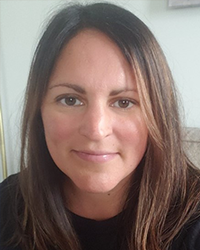
“We’re working in a society now that it doesn't matter what industry you're in, whether it’s healthcare, marketing, or finance, project management is in high demand.” - Haleh Rahimi, SCS learner
In her twelve years of healthcare administration, Haleh Rahimi has never been short of projects to keep her on her toes.
Over the years, colleagues who recognized her skills encouraged her to work towards earning her Project Management designation. Haleh knew that honing her instinctive project management abilities would be the key to propelling her career forward. She just needed to find the time.
“The reason I decided to finally do this was because I found the SCS Foundations of Project Management course and it was so flexible. The whole program was doable while working full time and managing my other responsibilities,” she explains.
Haleh was also thrilled to find that when she shared her plans to take project management courses at SCS, her employers at Sinai Health were happy to invest in her professional development by helping to fund her tuition.
She began her first course during a pandemic lockdown, and so was limited to online classes, and she was impressed to see that once in-person classes returned, they took place in the evenings, making it possible for her to attend after work.
“I couldn’t believe it, how flexible it was,” she says.
“I did my first two project management courses online and for me it was even better than being on-site. The lectures are recorded so even if you miss them you can go and watch them after. I didn’t miss any lectures but I did go and watch some of them twice even just to get a good, in-depth understanding of them.”
It took no time for Haleh to begin using what she learned in class at work.
“We’re working in a society now that it doesn't matter what industry you're in, whether it’s healthcare, marketing, or finance, project management is in high demand,” she says.
“So project management has always been a part of my job, and I started applying these tools, techniques, processes, and strategies on the spot.”
Haleh’s instructor, Peter Monkhouse, also ensured there were plenty of opportunities for her and her classmates to put what they were learning to the test in class. “He gave us in-depth, hands-on experience so I felt like a project manager right from the foundations course,” she explains.
“We were in teams working on actual projects and came away with a good understanding of the different approaches to project management. Not all the approaches are going to work well for all the projects that you are given. We learned how to decide why one is better than the other one and how you can use a combination of approaches.”
In addition to sharing his expertise during class, Haleh says Peter took the time to explain the 11 different certificates students could apply the Foundations of Project Management course to, and was always happy to go above and beyond to answer learners’ questions and share expert advice when asked. “You’d email him and have a response back before you’d even hit send,” she jokes.
As she continues to work towards her project management certificate at SCS, Haleh’s new skill set is already having a positive impact on her career. She is currently the executive assistant for medical affairs at Mt. Sinai hospital; the dept of obstetrics and gynaecology at Women’s College Hospital; and Toronto General Hospital, in affiliation with U of T medicine. And recently, she shares, her managers have taken note of her increased efficiency and ability to streamline processes within her department.
Haleh has even used her newfound skills to help a colleague manage a home renovation project, which she says just highlights how useful project management skills can be to anyone, regardless of the field they work in. “This is the course you want to take if you want to get a good, in-depth understanding of project management. The skills you learn in the Foundations of Project Management course can be applied to any industry. Whether you’re doing construction, working in retail, or in a hospital setting, it doesn't matter,” she says.
“Everyone can benefit from this course.”













